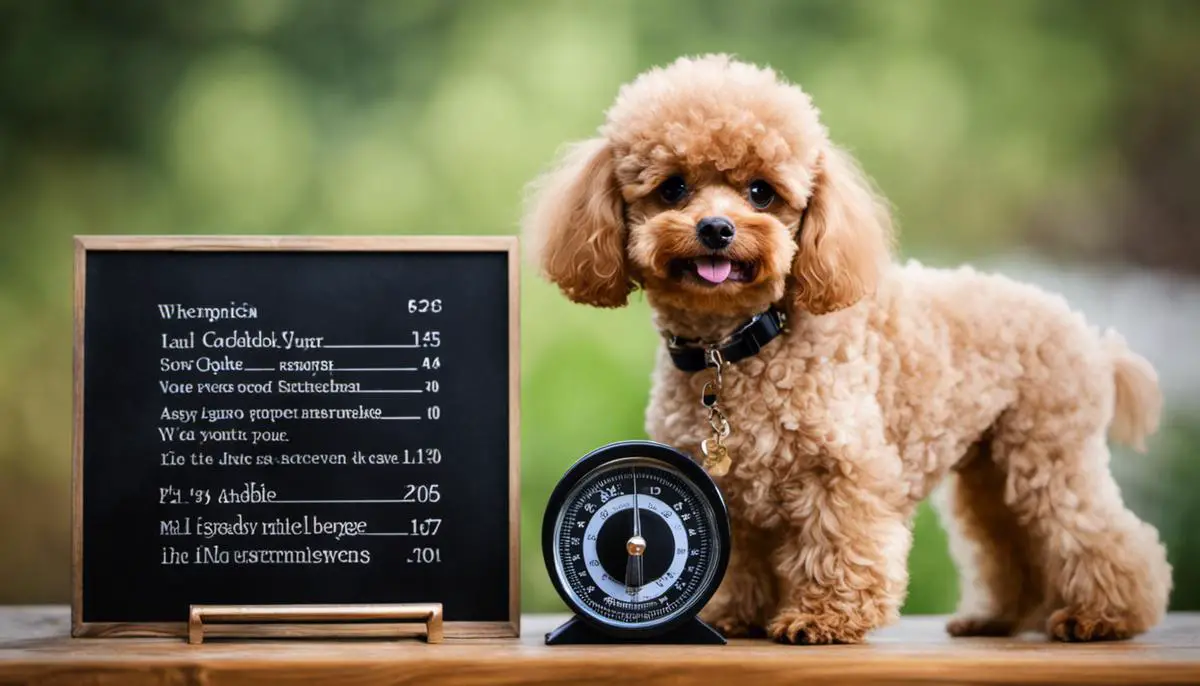Understanding Toy Poodle Size and Weight
Numerous dog-loving individuals are drawn to the adorable and compact appearance of the Toy Poodle, but understanding their average size and weight is crucial when considering adding one to your family. These factors play a pivotal role not only in ensuring that your space can accommodate the breed but also in maintaining its health and well-being. This discussion will explore the average size and weight of Toy Poodles, delving into aspects like height and length, typical weight, and factors influencing these characteristics such as genetics, diet, exercise, and health conditions. A detailed size and weight chart for this breed, demonstrating growth progression from puppyhood to adulthood, will also be addressed for a comprehensive understanding.
Average Size of a Toy Poodle
Average Size of a Toy Poodle: Height and Length
Toy Poodles are a breed admired not only for their intelligence but also for their suitable size; perfect for all types of living conditions. Typically, the height of a Toy Poodle at the shoulders, also known as the ‘withers’, falls between 9.75 to 10.75 inches. The length of the dog, which is measured from the chest to the rear, is approximately the same or slightly less than their height. This gives them a nearly square appearance. The size can slightly vary among individual dogs and there are a few factors that can affect this, such as genetics.
With regards to gender, there is not a substantial difference between male and female Toy Poodles. They are both ideally within the previously mentioned height range. Another factor to take into consideration is the weight of these compact pups. Adult Toy Poodles typically weigh anywhere between 4 to 6 pounds.
Keeping a Toy Poodle in good health is contingent upon factors like diet, activity level, and age. The size, well-being, and lifespan of these miniature canines can be significantly impacted by their genetic makeup and the balance of their diet. Providing quality dog food with complete nutrition can aid in maintaining the target size of a Toy Poodle. Good physical exercise routine is crucial for these small breeds to keep their muscle tone and prevent unnecessary weight gain. Their compact size makes them a great fit for individuals residing in apartments or homes with small gardens or yards.

Average Weight of a Toy Poodle
A Closer Look at the Typical Weight of a Toy Poodle
As the tiniest subgroup of the poodle breed, Toy Poodles typically clock in at a weight range of four to six pounds. However, an individual toy poodle’s weight may fluctuate to a little more or less than this average, given the variations in diet, physical activity, and general health condition. Balanced nutrition and consistent exercise are vital elements in managing a healthy weight for all dog breeds, and Toy Poodles are no exception. Over or underfeeding can potentially trigger serious health problems such as obesity and malnutrition.
Factors Influencing a Toy Poodle’s Weight
A toy poodle’s weight can be influenced by factors such as diet, exercise, and health conditions. A diet rich in nutrients and balanced proteins, carbohydrates, fats, vitamins, and minerals is essential for their health and weight maintenance. Regular exercise, suitable to their age and health condition, also plays a critical role in maintaining a healthy weight. Overweight toy poodles may be prone to health conditions like heart disease, diabetes and arthritis, while underweight ones can suffer from malnutrition. Occasionally, a poodle’s weight could be due to health issues, so regular check-ups with the vet are also crucial to track weight and overall health.
Promoting a Healthy Weight for Toy Poodles
The formula for maintaining a healthy weight in toy poodles includes monitoring their diet, ensuring proper physical activity, and scheduling regular vet visits. When it comes to meal portion sizes, a gradual approach should be applied – if you ring the alarm bells of weight increase, cut back the quantity bit by bit. Keep in mind that the dietary requirements of your toy poodle may shift as they get older, so a continuous dialogue with a vet is a wise idea. Exercise is valuable but be cautious not to overdo it, particularly for young and senior dogs. A sudden weight change can often signal an underlying health issue, and swift action can make a world of difference. Your toy poodle’s longevity and quality of life can be significantly enhanced by managing its weight effectively through vet check-ups, a well-planned diet and suitable exercise.

Toy Poodle Size and Weight Chart
Getting Acquainted with Toy Poodle Size and Weight
Toy Poodles fall within the small to medium-sized class among the variations of the Poodle breed. Their standard height as adults lies between 9.4 and 11 inches at the shoulder level, although there could be a slight variation based on factors like genetics and nutrition. Despite what their petite size might suggest, they pack a fair amount of strength and agility. True to their breed, Toy Poodles are muscular, well-structured, and exhibit an air of elegance, a trait intrinsic to Poodles irrespective of their size.
Toy Poodles: Weight Progression
Just like their height, the weight of a Toy Poodle is not very substantial. From a newborn puppy, a toy Poodle will typically weigh less than one pound. As a pup progresses through the puppy stage, the weight of a toy Poodle should increase roughly one pound to one and a half pounds each month until they reach adulthood at 6 months. By the time a Toy Poodle reaches adulthood, they generally weigh between 5 to 9 pounds. However, this can fluctuate based on their diet, exercise, and overall health status. Remember, maintaining an optimal weight is essential for the well-being of your Toy Poodle to prevent health issues such as diabetes or joint problems.

Understanding the size and weight of a Toy Poodle is a significant aspect when caring for one. This knowledge will ensure you provide the precise diet, exercise, and living space required for the canine’s robust health and development. Along with these factors, bear in mind that genetics and some uncontrollable conditions might influence the size and weight. So, it is essential to consult with a vet for regular health check-ups and specific advice tailored to your Toy Poodle. With careful management and proactive care, these delightful companions will live a long and joyful life.
